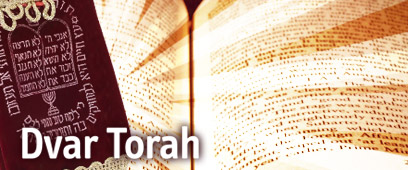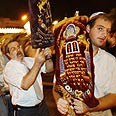

Perhaps that joy is seems awkward due the underlying premises that define Conservative-Masorti scholarship and theology.
Rejection of the idea of attributing the Torah to any Divine source, a view that is arguably attributable – at least in part – to our acceptance of biblical criticism (an otherwise vital, positive development), raises doubts in regard to the belief in “Heavenly Torah.”
This, in turn, can raise questions as to the justification for living in accordance with the Torah, even in a manner consistent with our own theological interpretation. To put it simply, if the Torah was not given from above (whatever that phrase may actually imply, and whatever our view of God may be), why should we observe any halachic norms?
What's the purpose?
This issue is brought into sharper focus in the "New Age" atmosphere - an atmosphere that reflects Western society's shifting the spotlight away from the question of the just allocation of wealth, moving from socialism to spirituality in its various forms.
As a result of this transformation of consciousness many Jews wonder: What purpose is served by living in accordance with the ancient mores of Judaism, if spirituality lies outside of Torah and halacha?
A poem written by the Jerusalem poet Zelda (Mishkovsky) – dedicated to her friend Yona Wallach – would appear to address this question.
Two Elements
The flame says to the cypress:
“When I see how calm,
how full of pride you are,
something inside me goes wild –
How can one live this awesome life
without a touch of madness,
of spirit,
of imagination,
of freedom,
with only a grim, ancient pride?
If I could, I would burn down
the establishment
that we call the seasons,
along with your cursed dependence
on earth and air and sun,
on rain and dew.”
The cypress does not answer.He knows there is madness in him,
and freedom,
and imagination,
and spirit.
But the flame will not understand,
the flame will not believe.
(The Spectacular Difference: Selected Poems of Zelda (trans. Marcia Falk))
In the dialogue between the flame and the cypress, the cypress emphasizes the concealed creativity and spirituality that characterize it. The cypress understands that the flame considers it boring, unexciting, and lacking spirituality or creativity.
But the cypress knows that its dependence upon the seasons of the year, to a system of rules, boundaries and limitations, is a creative dependence that is vital to any existence, and it is better to admit it than to ignore it. Yet, the cypress bows before the flame (in this era that worships flames), and justifies itself: I am imaginative and free, so do not mock me, flame.
Interestingly, the poem’s cypress does not emphasize what it has and the flame lacks: roots deeply planted in the soil, immortality through its progeny, a strong trunk that is not overwhelmed by water but is nourished by it. Nor does the cypress mention its fear that the flame might destroy it if it were to get too close…
This delicate parable is a metaphor for the relationship between different elements of human society and of nature. It is a tale of stereotypes and of pluralism in all their complexity, an allegory on how people and ideological movements view themselves and of how they are viewed by others.
This autumn of the year 5767, I would like to suggest that we also see this poem as a metaphor for the relationship of the Conservative/Masorti movement to Torah and halacha.
In a world fascinated by fiery passion, let us be the cypress to the extent that it represents an alternative to the blaze of spiritual fire. Let us be the cypress, with its roots and branches, a cypress firmly rooted in Torah, that grows and plants the seeds of new growth, for “it is a tree of life for all who hold fast to it.”
Torah roundtable
Abraham Joshua Heschel said:
The giving of the Torah – the written Law – is the beginning of the Torah, not its end. “When the Holy One gave the Torah to Israel, He gave it to them as wheat for making flour and as flax to make cloth” (Seder Eliahu Zuta, 2). “Had the Torah been given unambiguously parsed, no one could stand” (Jerusalem Talmud, Sanhedrin 4:2). “Without sages, there is no Torah” (Leviticus Rabba 11:7).
- What does Heschel mean by “the beginning of the Torah, not its end”? Wasn’t all of the Torah given at Sinai?
- What can we learn from the comparison of the Torah to wheat and flax?
- Is the giving of Torah dependant upon human beings? If so, in what sense?
- How are we to understand the aphorism “Without sages, there is no Torah”?
- Is this aphorism heretical?
- Are we to understand that a generation that lacks sages is a generation without Torah?
The midrash equates the day that the Torah was given with a wedding day. This metaphor is expressed, for example, in the commentary to a verse from the Song of Songs:
"Go forth, O daughters of Zion, and behold King Solomon, with the crown with which his mother crowned him on the day of his wedding, on the day of the gladness of his heart." (Song of Songs 3:11)
“On the day of his wedding” – This refers to Sinai, for they were married, as it says (Exodus 19): “and consecrate them today and tomorrow.” “On the day of the gladness of his heart” – This refers to the giving of the Torah, as it says (Exodus 31): “And he gave to Moses, when he had made an end (kikhalto)…” but what is written is “(And he gave to Moses) as his bride”. (Midrash Rabba 12:5)
- How does the midrash arrive at the conclusion that the wedding day of King Solomon is like the day of the giving of the Torah on Mount Sinai? Note that the Torah employs the term consecrate in regard to the preparations for the theophany.
- How does the midrash arrive at the conclusion that “the day of the gladness of his heart” of King Solomon is like the giving of the Torah?
- Do you think one can compare the giving of the Torah to a wedding day?
Rabbi Dr. Einat Ramon is the Dean of Schechter Rabbinical Seminary















